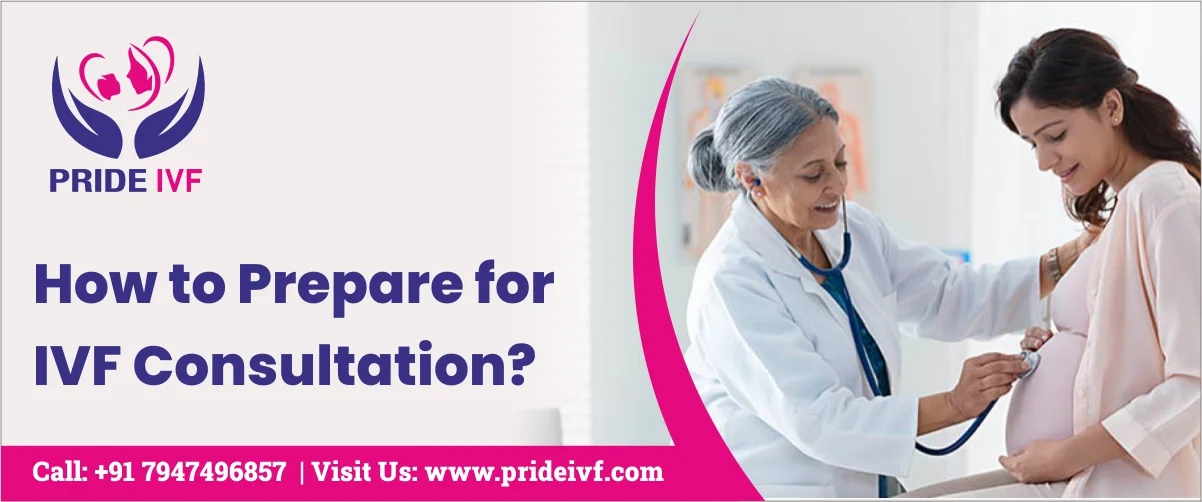The IVF consultation marks the starting point of your fertility journey, where you’ll meet with a specialist to discuss your options. Preparation is key to making this consultation successful. By gathering the necessary documents and information beforehand, you can ensure that your doctor has all the details to tailor a treatment plan just for you. Throughout this guide, we’ll provide you with practical tips and insights on how to prepare for IVF consultation. Let’s begin this journey together, laying the groundwork for a fruitful consultation and, ultimately, a successful IVF treatment. Consult Pride IVF centre in Delhi today.




Understanding the Purpose of the IVF Consultation
Many people wonder “IVF kya hai?”, IVF is a medical procedure designed to assist individuals or couples in conceiving a child when natural conception is not successful. The IVF consultation aims to assess fertility health and discuss treatment options, serving as a crucial first step in the IVF journey. Clear communication with the fertility specialist is key, allowing for a thorough understanding of the patient’s medical history and concerns.
Patients should feel comfortable discussing their worries, as this helps the specialist suggest the most suitable treatment plan. Open dialogue builds trust and ensures both parties are aligned. Preparation and open communication enhance the effectiveness of the consultation.
Gathering Necessary Documents and Information
Before your IVF consultation, it’s crucial to gather important medical records, such as past fertility tests, treatments, and any existing medical conditions. These records provide valuable insights intprio your fertility history, helping your fertility specialist tailor a personalized treatment plan. By being well-prepared with the necessary documents and questions, you can make the most of your consultation and take positive steps towards your fertility journey.
Researching the IVF Process
The IVF process involves several key stages, each playing a crucial role in achieving a successful outcome:
Ovarian Stimulation
- Patients receive hormonal medications to stimulate the ovaries for egg production.
- Monitoring through blood tests and ultrasound scans helps adjust medication doses.
Egg Retrieval
- Mature eggs are retrieved through a minor surgical procedure under sedation.
- Eggs are collected using a thin needle and transferred to the laboratory for fertilization.
Fertilization
- In the lab, eggs are fertilized with sperm to create embryos.
- Embryos are monitored for growth and development.
Embryo Transfer
- Selected embryos are transferred into the uterus in a simple procedure without anesthesia. Monitor after embryo transfer day by day symptoms.
Pregnancy Testing
- Approximately two weeks after embryo transfer, a pregnancy test determines treatment success. Doctor’s often recommend 11 days after embryo transfer pregnancy test.
Understanding common fertility terminology can help patients better comprehend the information provided during the consultation:
- Ovarian Reserve: Refers to the quantity and quality of a woman’s eggs.
- Follicle: A fluid-filled sac in the ovary that contains an immature egg.
- Blastocyst: An embryo that has developed for about five to six days after fertilization.
- Implantation: The process by which the embryo attaches to the lining of the uterus.
- SuccessRates: The likelihood of achieving a live birth through IVF treatment, often expressed as a percentage. IVF success rates can vary from person to person.
By familiarizing themselves with these terms and the IVF process, patients can feel more confident and empowered to participate in discussions with their fertility specialist during the consultation.
Lets get started
What to Expect During Your IVF Consultation
During your IVF consultation, expect a structured session with your fertility specialist, typically lasting around 60 to 90 minutes. Here’s during IVF consultation what to expect:
- Initial assessment of your medical history and concerns.
- Discussion of fertility goals and potential treatment options.
- Physical examination and diagnostic tests if needed.
- Explanation of treatment options and expected outcomes.
- Personalized medical advice and recommendations.
- Discussion of next steps and follow-up plan.
- Opportunity to ask questions and seek clarification.
Essential Questions to Ask Your IVF Doctor
Here are some essential questions to ask your IVF doctor in delhi during your consultation:
- What is the success rate of IVF treatment at your clinic?
- What are the potential risks and side effects associated with IVF?
- Can you explain the medication protocols involved in IVF treatment?
- Are there any alternative treatment options available if IVF is not successful?
- How many embryos will be transferred during the procedure?
- What are the chances of multiple pregnancies with IVF?
- How Is IVF Pregnancy Different From Natural Pregnancy?
- Can you provide information on any additional procedures or tests that may be recommended during the IVF process?
- How will you communicate with me throughout my treatment journey?
- What support services are available to patients undergoing IVF?
- Can you explain the financial aspects of IVF treatment, including any potential additional costs?
- Are there any lifestyle changes or precautions I should consider during IVF treatment?
- Do you have any recommendations for managing stress and emotional well-being during the IVF process?
Remember, it’s important to seek clarification on any aspects of the IVF process that you find confusing or concerning. Your fertility specialist is there to support you and provide guidance every step of the way. (Read: Who is the Most Famous IVF Doctor in India?)
Reflecting on Failed IVF Attempts: What Comes Next?
Experiencing disappointment and frustration after failed IVF attempts is completely understandable. During this challenging time, it’s crucial to remember that support systems are available to help you cope. As you discuss your next steps with your doctor, it’s beneficial to have a list of questions to ask IVF doctor after failed IVF cycle. Consider inquiring about potential reasons for the unsuccessful cycle and what adjustments can be made for future attempts. By focusing on learning from the experience and exploring alternative treatment options, you can increase your chances of success. Explore how to make ivf successful the first time.
Lifestyle and Dietary Changes
To optimize fertility, focus on maintaining a healthy lifestyle and diet. Aim for a balanced diet rich in nutrients like fruits, vegetables, whole grains, and lean proteins. Avoid processed foods and excessive sugar intake. Additionally, maintain a healthy weight through regular exercise and portion control. Quit smoking and limit alcohol consumption, as they can negatively impact fertility. Prioritize adequate hydration and get plenty of rest to support overall reproductive health.
Financial Considerations
When considering IVF treatment, it’s important to understand the potential costs involved. These may include IVF consultation cost, diagnostic tests, medications, and procedure expenses. Patients are advised to inquire about insurance coverage for IVF and explore available financial assistance options. Understanding the financial aspect of IVF treatment upfront can help patients plan and budget accordingly for their fertility journey.
Things I Wish I Knew Before Starting IVF
Here are some practical tips for planning logistics before your IVF consultation:
- Schedule time off work for appointments well in advance.
- Arrange transportation to and from the fertility clinic.
- Confirm the location, date, and time of your consultation beforehand.
- Plan for any additional time needed for traffic or unforeseen delays.
- Consider bringing a friend or family member for support during your consultation.
Remember to take care of yourself physically and emotionally. Practice self-care and find activities that bring you joy and relaxation. Stay hopeful, but also be prepared for the possibility of setbacks. IVF can be a challenging journey, but many couples ultimately achieve their dream of parenthood by addressing some of the things I wish I knew before IVF.
Conclusion
Thorough preparation is essential for a successful IVF consultation. By gathering essential documents, understanding the IVF process, and asking important questions, patients can make informed decisions about their fertility journey. Taking proactive steps and advocating for their needs empowers patients to optimize their fertility health and increase their chances of success. With careful preparation, patients can approach their IVF consultation with confidence and clarity, setting the stage for a positive treatment experience.




